BU LEAP’s research collaboration with Invisible Flock will culminate this year headlining the Brighton Festival on 6 and 7th May in the beautiful Dome Theatre.
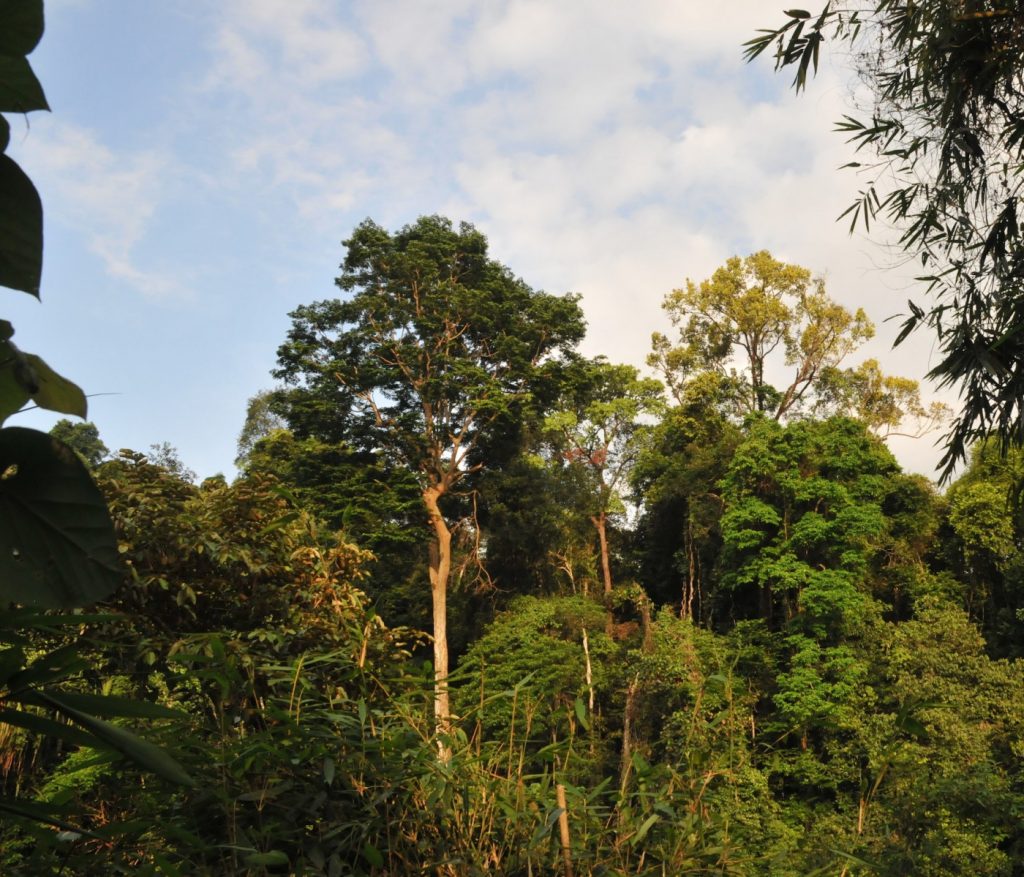
A tall siamang sleeping tree. By AHKorstjens
The sleeping tree is a celebration of the beauty of the Indonesian forest.
Sleeping trees are large trees that are regularly re-used by primates. In this case the work is inspired by the small ape the siamang, Symphalangus syndactylus. Siamangs are endangered apes that live in small monogamous family groups and eat mostly fruit and leaves high up in the canopy. At that height, they are exposed to the high temperatures that we now see in this region. BU’s LEAP research has focused on understanding how temperatures and forest structure vary within this diverse yet previously selectively logged forest, and how such variation influences the behaviour and survival of local wildlife.
How do apes manage current and future conditions?
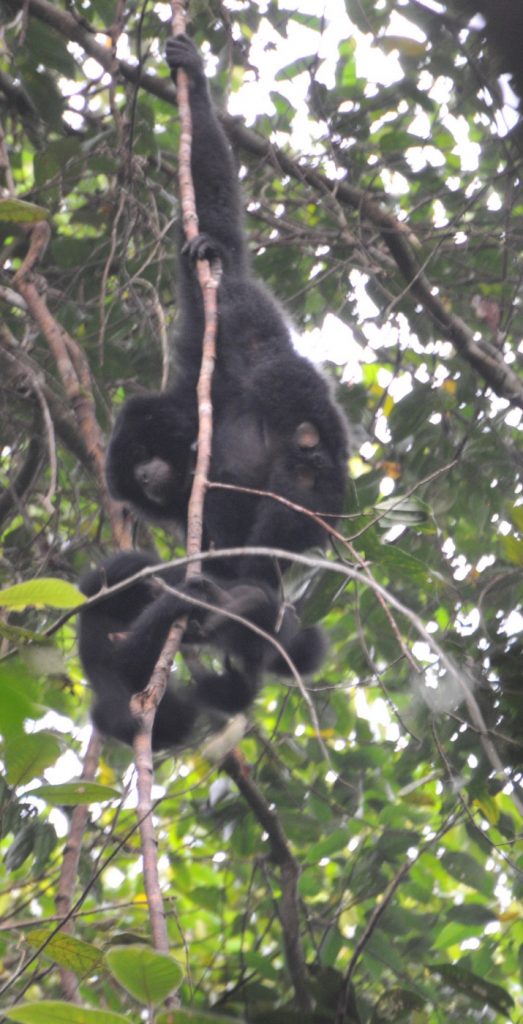
Siamang Mother and Child at Leuser National Park, Credit: Amanda Korstjenst
LEAP (Landscape Ecology and Primatology) research at BU is led by Prof. Amanda Korstjens, Prof. Ross Hill, Dr Philippa Gillingham, and Dr Tom Davis. Siamang research at BU formed part of the PhD research of Dr Chris Marsh and Dr Helen Slater and the MRes research by Emma Hankinson, Rosanna Consiglio, Nathan Harrison, and Jake Hill. Chris and Nathan followed siamang daily through the forests, with local rangers Ucok, Dian and Yagsa, and other Sikundur field station rangers.
Visitors to The Sleeping Tree at Brighton Festival will enjoy the multitude of sounds typical of this biodiversity hotspot. The experience follows the natural cycle of sounds within the forest and is ever changing. If you get up early on Sunday the 7th you can enjoy the morning call chorus of siamangs, lar gibbons and Thomas langurs. Throughout the Saturday and Sunday there will be the multitude of sounds of insects (especially the always present cicadas), amphibians, birds, deer, pigs, monkeys, elephants, and other wildlife that inhabits the forest. On Saturday there will be a panel discussion about acoustic research and the plight of biodiversity in Sumatra. Sunday also features a unique sound performance The Sleeping Tree Sound Installation | Brighton Festival
The recordings were collected within the Gunung Leuser Ecosystem, the last place on earth that harbours orang-utans, Sumatran tigers, Sumatran elephants, Sumatran rhino, and two smaller ape species (the siamang and the lar gibbon). This forest is one of the world’s most biodiverse places and plays a major role in the world’s hope of managing climate change.
Gunung Leuser ecosystem is a designated UNESCO Biosphere but it is only partly protected as a National Park and it is under constant threat of human encroachment, logging, and extraction of forest products and wildlife.
BU’s LEAP team has worked with Syiah Kuala University, Sumatran Orangutan Conservation Programme (SOCP), Liverpool John Moores’ university, Invisible Flock, and award-winning Leuser Conservation Forum (FKL) to better understand which aspects of forest structure and micro-climatic conditions influence the survival of orang-utans, siamang and elephants.
Our acoustic journey started with a collaboration with Dr Tom Davis at BU and continued with the collaboration with the multi-award-winning interactive arts studio Invisible Flock. Victoria Pratt, Ben Eaton and Amanda Korstjens tried out various acoustic devices under the very challenging Sumatran forest conditions, during a great (occasionally muddy) trip to the Sumatran forests. Based on our findings, Invisible Flock then developed the bespoke audio recording equipment (see OFR – Open Field Recorder – Invisible Flock) and The Sleeping Tree (Pohon Tidur) – Invisible Flock.
The recordings used for the Brighton Festival sound installation consist of those collected by Victoria Pratt, Ben Eaton and Simon Fletcher, supported by LEAP, FKL, and SOCP, using directional and ambisonic microphones. These are supplemented by the OFR recordings set out by the Invisible Flock team and managed and collected over 3 months by Dr Helen Slater.
The field work depended further on many people, including Dr Abdullah Abdullah of Syiah Kuala University (UnSyiah), and Matthew Nowak and Iain Singleton of SOCP, Graham Usher, the amazing SOCP field staff at Sikundur: Suprayudi, Ucok and Supri, Riki, Ben, Winn, Argus, Chiara Ripa, and the always inspiring Rudi Putra and the team of Forum Konservasi Leuser (FKL).
Currently, BU undergraduate Independent Research Students, Chloe Shaw, Ellie Vincent, Archie Bedford, and Devon Humphries are analysing the sound files to further identify how distance to forest edge, and gun shots at night influence siamang, Thomas langurs, birds, and lar gibbon vocalisations captured by Dr Slater’s work. Their work will feature on videos displayed at the exhibition.
Find LEAP’s scientific publications via BU’s e-prints: Bournemouth University Research Online [BURO] – Search results for Sikundur.
More information on the work by LEAP: go-LEAP: Landscape Ecology and Primatology
More information on the work by Invisible Flock: Home – Invisible Flock
More details and information on the work, see: our publication: https://issuu.com/invisibleflock/docs/the_sleeping_tree_publication
To support conservation in Leuser, please support the FKL: https://leuserconservancy.or.id
Sumatran Orangutan Programme: SOCP – Sumatran Orangutan Conservation Programme

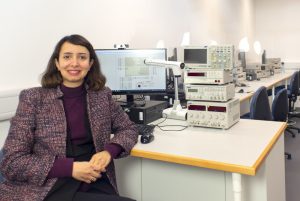
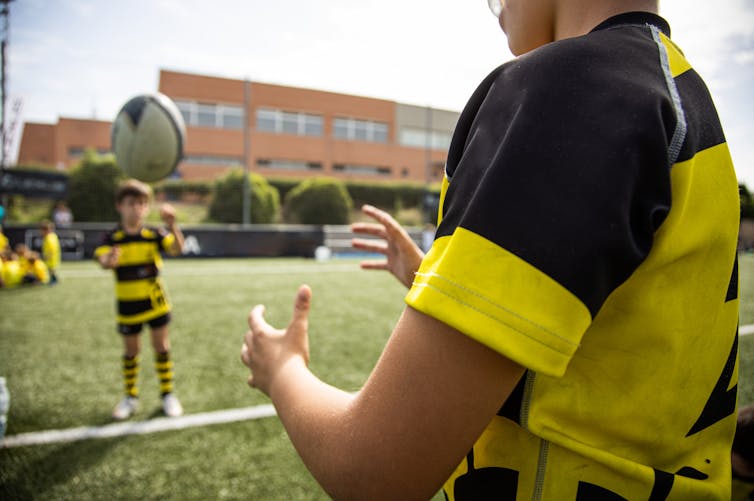


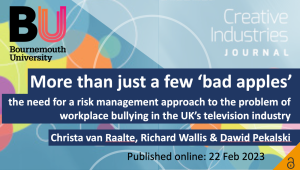 18-months ago we published
18-months ago we published 

 The next event in our
The next event in our 



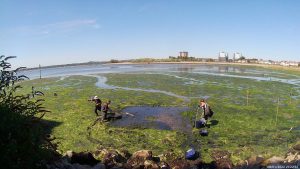
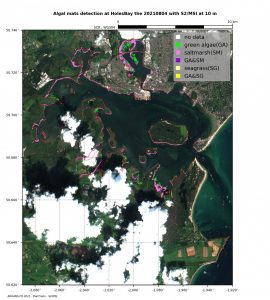


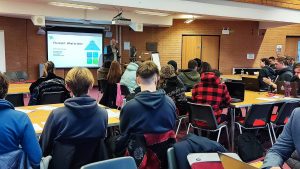
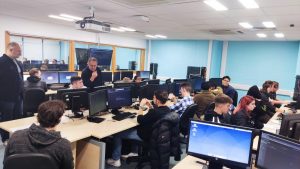


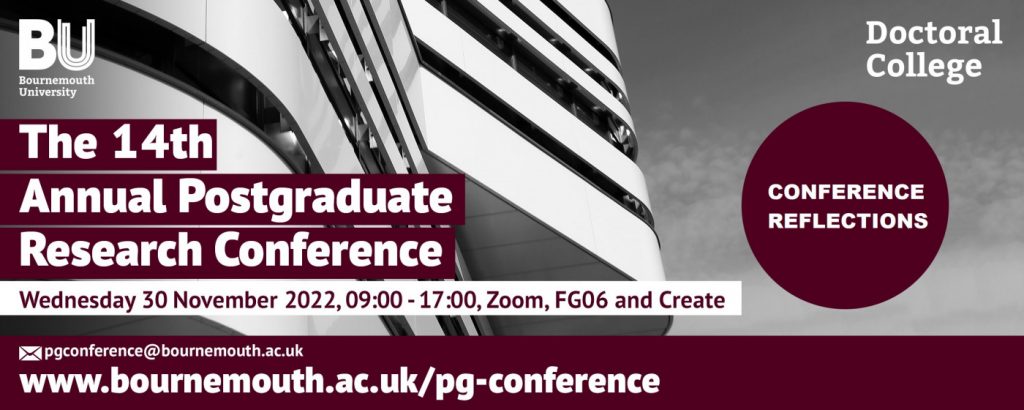











 Read and sign up to BU’s Policy Influence Digest
Read and sign up to BU’s Policy Influence Digest Upcoming opportunities for PGRs – collaborate externally
Upcoming opportunities for PGRs – collaborate externally BU involved in new MRF dissemination grant
BU involved in new MRF dissemination grant New COVID-19 publication
New COVID-19 publication MSCA Postdoctoral Fellowships 2024
MSCA Postdoctoral Fellowships 2024 Horizon Europe News – December 2023
Horizon Europe News – December 2023